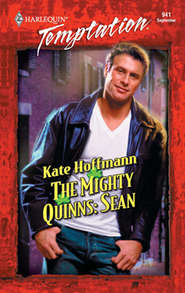По всем вопросам обращайтесь на: info@litportal.ru
(©) 2003-2024.
✖
The Mighty Quinns: Jamie
Автор
Год написания книги
2019
Настройки чтения
Размер шрифта
Высота строк
Поля
From that moment on, she’d kept the men in her life at a distance. She’d dated and enjoyed some passionate short-term affairs, but she’d kept her heart locked away. Most men found her approach attractive and enjoyed the no-strings sex. And though most of her lovers would have been happy to continue, Regan had always been the one to end it.
As she continued to watch the fox, Regan thought about all the photos she’d taken as a wedding photographer. People said she had a way of capturing emotion in her photographs of inanimate objects—rose petals on a white runner, a wedding program left on a church pew, a veil tossed across the back of a chair. She mixed these photos with stunning candids and beautiful portraits, capturing the day in a way that no one else could.
It was easier to believe in the fairy tale when she stood behind the camera. It was like a filter that took away the everyday realities of love and marriage and froze the moments of perfection for all time.
A soft breeze buffeted the dead leaves that covered the roadside, sending them onto the pavement in swirls of color. Suddenly, the low morning light finally broke through the trees. Horizontal shafts of illumination reflected off the moisture in the air and the colors shifted, becoming supersaturated, an emerald so vivid it seemed unreal.
She brought the camera up again and began to shoot. The fox sniffed at the wind, then flicked her tail, turning its attention to the road. Regan held her breath as she continued to shoot. It was as if the fox sensed that Regan meant no harm. In fact, she wanted her photo taken.
The sunlight moved up the facade of the chapel and had nearly covered the fox with a diffuse light. Suddenly, the fox’s ears pricked up and she cocked her head. Regan let out a soft gasp as she heard the sound of singing echoing through the woods.
“Give me some men, who are stout hearted men, who will fight for the right they adore.”
In a heartbeat, the fox bounded off into the woods. Regan looked up from her camera, cursing softly, as the voice grew louder. A few seconds later, she saw a runner approaching from the opposite direction. He wore running pants and trainers, but he’d removed his long-sleeved shirt and tied it around his waist. His chest was bare to the cold and gleaming with moisture.
He continued to sing the song until he caught sight of her. Then he stopped in the middle of the road, as if he were startled to see somebody out so early in the morning. Steam seemed to swirl around his body—from the cold air meeting his warm skin—and for a moment, Regan wondered if he was real.
They stared at each other for a long moment, like predator and prey, although Regan wasn’t sure which one of them was which. She wanted to scream at him and throw rocks and sticks until she punished him for ruining her photo session. But all she could manage was a frustrated shriek and a sarcastic “thank you.”
She spun on her heel and started back toward her grandmother’s house. The family of foxes would have been a cute photo, one that she could have turned into a postcard for the tourists who flocked to Pickett Lake every summer. Instead, some bonehead more concerned about his washboard abs and muscled calves than appreciating nature had ruined it.
A few seconds later, the runner caught up to her. “Did you just thank me?”
“I wasn’t being grateful,” Regan said. “You just scared away my shot.”
“Your shot?”
“A fox. Sitting on the chapel steps. Perfect light.”
“All the better,” he said. “You might’ve killed me.”
Regan held up her camera, waving it in his face. “Not that kind of shot. Though the way I feel right now, I could kill you,” she said. “It was going to be a beautiful picture, and you ruined it with that ridiculous song.”
“You know that song?”
“My grandfather used to sing it every year when we dragged the dock down to the water.” Regan couldn’t help but smile at the memory of all the grandchildren lined up on either side and marching the heavy wooden structure down to the water. It was an annual rite of passage. No one was allowed to swim in the lake until the dock was in.
“Well then, I suppose I do owe you an apology. I’m sorry for ruining your shot,” he said. “And I guess if you’re determined to shoot me there’s nothing I can do about it.”
He ran a few steps ahead of her, then turned to face her, jogging backward and holding his arms out. “Go ahead, I’m ready to accept my punishment.”
Regan couldn’t help but smile again. She’d been so angry with him just a few moments ago and now he’d made her smile. Who was this man?
She raised her camera and snapped a few frames. He clutched his chest and stumbled slightly. “I suppose I deserve that.”
Regan raised her camera again, this time focusing on his face. He continued to increase the distance between them as she continued to shoot, and when she pulled the camera down, he was twenty yards away. She opened her mouth, ready to ask him to stop. She wanted to know more about him, where he came from, what he was doing on the road so early in the morning. But in the end, she let him escape. He finally faced forward and continued down the road, singing the song boisterously.
Regan quickly grabbed a few shots of his retreat, then stood in the middle of the road and listened to the last echo of his voice. She’d had a lot of strange encounters on her early morning walks, mostly with wild animals. She could say with complete confidence, though, that she’d never had an encounter with such a handsome man.
She realized it had been a long time since she’d enjoyed being with a sexy man. And she had a few months before she headed to Arizona for the winter. Regan glanced at her watch. If he ran on a regular schedule, she might catch him out here again tomorrow morning. Then she might be able to find out where he lived and who he was. And she wouldn’t be so...so tongue-tied.
Regan hurried back to the house, slipping silently inside and heading for the kitchen. She pulled the data stick out of her camera and plugged it into the laptop she’d left on the kitchen counter the night before. Tapping her finger impatiently, Regan waited while the images loaded. The instant they had, she brought up the pictures of the stranger.
Clicking on his face in the first one, she enlarged the photo until she could see every detail. Her breath caught in her throat as she stared into his deep blue eyes. “Oh, my,” she murmured, pressing her hand to her chest. Her heart was pounding beneath her palm and she tried to draw a deep breath again.
The photo showed the mist and the sunlight filtering through the trees and catching the sheen of moisture on his face and body. It all combined to produce a beautiful image of an incredibly stunning man. Regan swallowed hard as she reached out to touch her computer screen.
In the image, he was holding his arms out, challenging her to shoot. His smile was playful, teasing...as if he knew exactly how to make her laugh. And she had laughed.
Handsome and sexy and funny. Exactly what she looked for in a man. Since Jake, she didn’t need to worry about anything else—like fidelity or honesty or loyalty. She never allowed her relationships to reach the point where those qualities made a difference. She wasn’t looking for Prince Charming anymore. But that didn’t mean she’d didn’t want a man in her bed every now and then.
She had twenty-four hours. Then she’d walk the road again and hope that this charming, sexy guy was a creature of habit.
* * *
A BRISK BREEZE sent leaves skittering across the main street of the small town of Pickett Lake. Jamie Quinn got out of his pickup and looked both ways before jogging to the opposite sidewalk. He climbed the front steps of the old hardware store, reaching into his jacket pocket for the business card of a local real estate agent.
He’d arrived in town yesterday evening, taking a room at a local motel. After a decent night’s sleep, a great morning run, an odd encounter with a feisty photographer and a hearty breakfast, he was ready to get down to business.
Jamie was on a strict schedule that didn’t allow for any flexibility. He had just two more weeks to find a piece of land before he was scheduled to start building his first modular home. After that, every hour would be accounted for on a time sheet that would be analyzed and discussed between him and his two business partners.
He stepped inside the store, the old wood floors creaking beneath his feet as he searched for a friendly face. He noticed that the other patrons were simply piling their purchases on the counter, then going back through the aisles to fetch the additional items they needed.
An elderly man nodded at him. “Can I help you find anything, sir?”
“I’m looking for Walt Murphy,” Jamie said.
“Can I tell him what it’s about?”
“I’m Jamie Quinn. I called him yesterday. I’m looking to lease a lot with lake frontage.”
“You want to rent a piece of property?” the man asked.
“No, just the land...it’s kind of a complicated story. Can you get Walt?”
“He’s in the back. Let me fetch him for you,” the clerk said.
The idea for Habikit had come a few years ago, as he and two friends had gone out for beers after a hockey game. Sam Fraley, an architect, and Rick Santino, a construction contractor, had been arguing about the “tiny house” movement and the potential effects it could have on the construction industry.
But Jamie had argued that it offered intriguing possibilities to provide prefabricated homes to the homeless. There’d been a time in his life when safe and warm housing wasn’t always a given, and he’d been searching for the opportunity to do something to help others in the same situation.
And so the Habikit was born. The materials for a complete two-hundred-square-foot home would be packed in a box and shipped to wherever it was needed. They’d designed each kit to be a module that could be expanded to make a larger home for a reasonable price. Sam and Rick and Jamie worked to make the kit simple to construct, with a minimum of tools and equipment. They’d also focused on making the kits “green” and using recycled materials whenever possible, achieving a nearly net-zero carbon footprint.
It had been a labor of love for the three of them, and after a year of designing, they’d built their first module together, donating it to a homeless housing project in Minneapolis. The tiny home had garnered a multitude of awards, along with the interest of investors. But those investors were looking for proof that Jamie and his friends could make a profit. So they’d devised phase two—using the concept to build a vacation home.
The sale of modular vacation homes would provide a major source of funding for the nonprofit homeless project. But it wasn’t enough to make up a brochure with an illustration. Investors wanted to see a real home built in a natural setting and they were in danger of losing their most important investor if the project wasn’t finished within a month.
So Jamie had set out to lease a piece of waterfront property. Once he’d obtained the proper permits, he’d build Habikit’s first multi-module home, documenting it along the way with photos and videos for the instruction manual.











